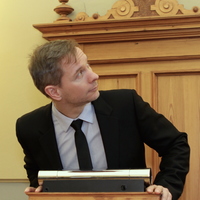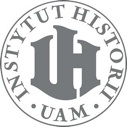Kalle Pihlainen (a senior research fellow at the School of Humanities of Tallinn University, Estonia), on Thursday, January 11th, 2018, at 11:oo, Collegium Historicum, ul. sw. Marcin 78, 61-809 Poznan, NAMO project, room 123, will give a seminar talk: "Why we still need narrative theory of history."
Organization: Ewa Domanska, email: ewa.domanska@amu.edu.pl and Ulrich Timme Kragh
Guest talk is supported by: Department of History Adam Mickiewicz University in Poznan and ERC-funded AMU project "Narrative Modes of Historical Discourse in Asia" (NAMO).
Kalle Pihlainen
Why we still need narrative theory of history
guest seminar
Thursday, January 11th, 2018, 11:oo-13:oo
Collegium Historicum, ul. sw. Marcin 78, 61-809 Poznan, NAMO project, room 123
Kalle Pihlainen
Why we still need narrative theory of history
Recent theoretical interest in moving "beyond" language has often been poorly popularized in debates concerning history, too often simply presenting as a neglect of the core philosophical insights of the previous half century or so. This talk aims at a defence of narrative theory or narrative constructivism against simplistic readings of its content. By focusing on the idea of "narrative truth", my goal is to show that – in addition to helping historians make peace with constructivist premises – openness to narrative theory can still support a useful rethinking of the commitments of disciplinary history. To this end, I will discuss several common misunderstandings concerning the relation of representation to reality, the nature of history as a discursive practice and the more specific epistemological claims made by narrative constructivists. Particular attention will be on intuitions that the past is storied in itself, assumptions that historical representation is somehow a "natural" or essential aspect of cognition as well as on beliefs regarding the role played by facts in historical representation. Also, and in light of my discussion of these other biases, I will touch on the currently popular focus on the relation of experience and history.
Required reading: Kalle Pihlainen, The Work of History. Constructivism and a Politics of the Past, Routledge, 2017 (chapter 2 and 3).
Kalle Pihlainen
is senior research fellow at the School of Humanities at Tallinn University, Estonia, and editor of Rethinking History: The Journal of Theory and Practice. His research focuses on the theory and philosophy of history as well as literary and historical culture, with particular emphasis on the ethics and politics of historical representation, embodiment and existential phenomenology. His book, The Work of History: Constructivism and a Politics of the Past (Routledge, 2017), explores recent theory debates and their implications for writing history today.
Kalle Pihlainen, The Work of History. Constructivism and a Politics of the Past, Routledge, 2017.
Futures for the Past, ed. Kalle Pihlainen, Routledge 2017.
History in the World, ed. Kalle Pihlainen, Routledge 2017.


